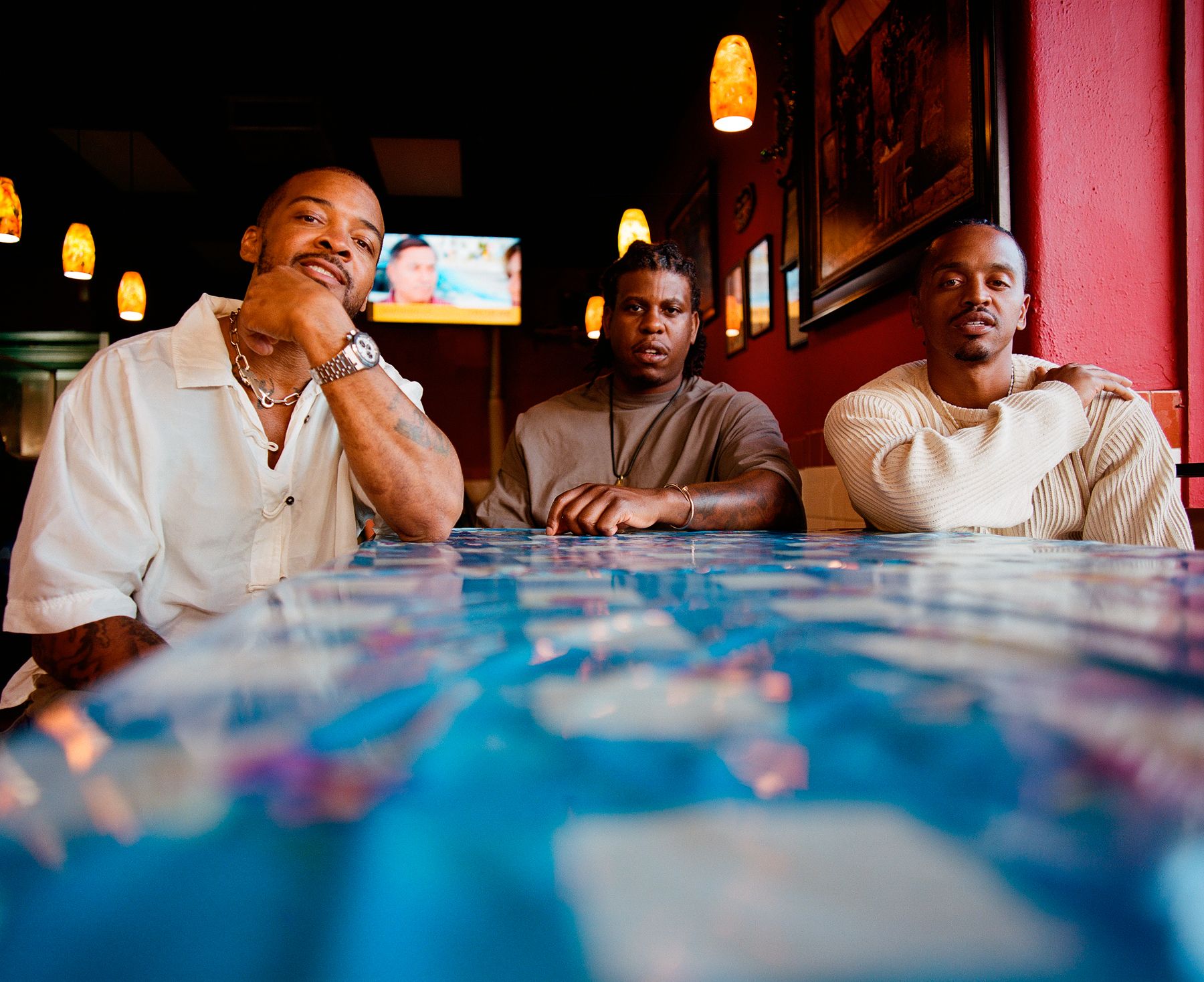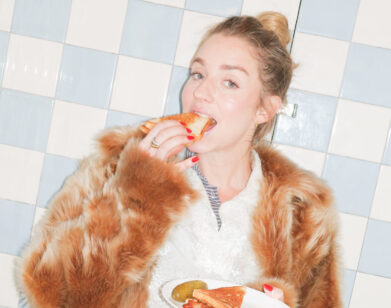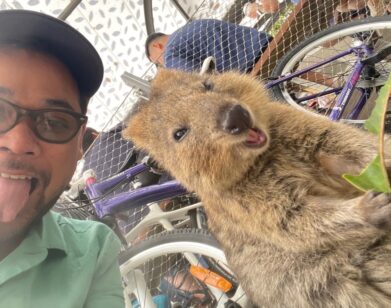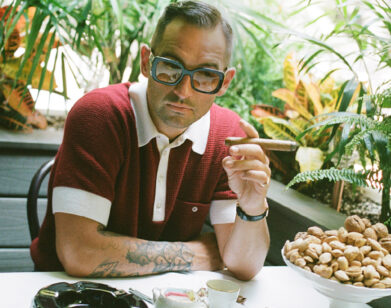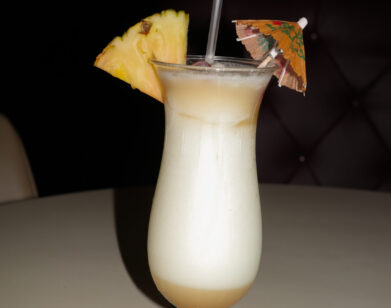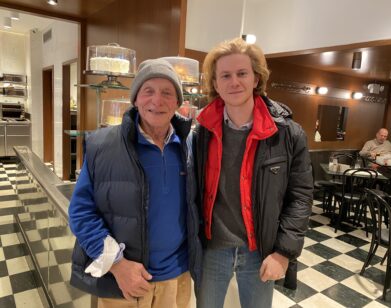BON APPÉTIT
“From Mott Haven to the Met”: Meet the Culinary Collective Ghetto Gastro
The first two lines of Black Power Kitchen, a new cookbook from the Bronx-based culinary collective Ghetto Gastro, read, “It’s a cookbook. It’s a manifesto.” These assertions speak to the heart of the mission Ghetto Gastro founders Jon Gray, Lester Walker, and Pierre Serrao laid out when they began hosting their first underground dinner parties over a decade ago. As renowned food historian Dr. Jessica B. Harris lays out in the book’s striking forward, “food is a weapon,” neither apolitical nor ahistorical. The 307-page tome itself transcends categorization. It is no mere cookbook, but a blend of brilliant, full-color photography, poetry, paintings, illustration, essays and, of course, scores of recipes inspired by Gray, Walker, and Serrao’s home borough. The bodega favorite chopped cheese is reworked as the plant-based “chopped stease,” and the nutcracker is rightfully reclaimed as the original pre-batched cocktail, a format long considered an invention of bartenders at swanky Manhattan watering holes. Reading Black Power Kitchen, you come away with a deeper understanding of the rich cultural heritage behind some of the most beloved dishes from the Black diaspora. After the trio celebrated the launch of Black Power Kitchen with a blowout bash in the Metropolitan Museum of Art’s Temple of Dendur, they sat down with Glynn Pogue—a Bed-Stuy native and co-host of the funny and always insightful podcast Black Girls Texting—to discuss the myth of “elevating” classics, the meaning of nourishment, and why purchasing their book is getting away with “highway robbery.”—CAITLIN LENT
———
GLYNN POGUE: Should I go off camera too? You all are not going to see each other?
JON GRAY: I’m chewing food right now so I don’t want to violate.
POGUE: That’s funny because my first question to you all was going to be, have you eaten yet today? And if so, what have you had?
GRAY: Took my third bite. It’s a leftover plate of salmon and brussels sprouts from Mizlala on West Adams in LA with a little bit of Fly by Jing chili crisp and some spicy Sovereign syrup on the brussels.
PIERRE SERRAO: I’m on a liquid diet right now. I’m on water and orange juice. I walked by a bagel spot earlier when I went to go get some weed and the bagels were trash, so I got to start over. I’m not going to eat until 12 o’clock.
POGUE: Oh, wow.
LESTER WALKER: Once 12 o’clock hits I’m going to hit the Beverly Hills Juice Club and load up on a Banana Manna shake and some E3 shots, make it pop.
POGUE: Very healthy over there, y’all are.
WALKER: Health is wealth, baby.
POGUE: Exactly. I asked that question because I spent some time living in Cambodia when I graduated from college and the way that they would greet people there was to ask, “Have you eaten rice yet?” It was really a way to check in on their wellbeing, and it acknowledged the fact that to be fed and nourished was to be well. And I was curious if that sentiment resonates with you all at all.
WALKER: I take that as showing huge empathy and compassion for one another. And me and my brothers, we do our best to check with one another. Did you hit the gym this morning? Did you eat? Did you have breakfast? Where are we eating? These are things that connect us all.
POGUE: Entirely. It reminds me of exchanges I’ve had with my own family and visiting my grandmother who’s from the South. The first thing she would say to me when I walked in was, “Are you hungry?” And she would make sure that I left with food, too. And it got me to reflect on this cross-cultural connection with nourishing one another, with taking care of each other.
GRAY: Food is definitely a love language. Nourishment is how we care for our people and how we soothe each other. I think it’s a great tool for bonding. I don’t want to gloss over the fact that you lived in Cambodia though. How did you get there?
POGUE: I was a Peace Corps volunteer, so I taught English there.
GRAY: Amazing.
SERRAO: I’ll chime in on what Jon said too about the food thing. In our community, food is not a neutral topic. And we know that the reason why your grandmother and our aunties and stuff like that asked us if we ate is because there’s a lot of people in our neighborhoods who don’t have access to food and who might just be moving so fast where they’re not putting the fuel in the tank. You can’t run on E. And we were able to collaborate with Osayi [Endolyn] and have her help us really distill our messages into words, into a tangible item that people could consume and share with each other.
POGUE: Let’s talk more about the book. It’s absolutely gorgeous. It’s so striking the way that it’s arranged. The blend of interview and poetry and imagery, essays, the recipes. How did this come to be? How long have you been working on it?
GRAY: Our whole lives and the ancestors’ lives too. But really we worked on it for three years. We started in 2020 in the beginning of the year and then we all know, the events of 2020 from the lockdown in the first quarter of the year to the uprisings with the murder of George Floyd and Breonna Taylor. So all of these things were coming to a head and it’s crazy because we’ve always been radical in our thoughts about Black power, Black liberation. So it was interesting to see how the world shifted that year as we were making this. But when it comes to the co-mingling of all of those disparate things, it’s really the definition of Ghetto Gastro. We’ve existed in the abstract. We’re not just makers of food. We use food as a vehicle to tell a story. So we have to also bring in our community of creatives to use their gifts to liberate and uplift Black people. We really wanted to celebrate all of those vibes. Black power is radical and it is beautiful and it is joyous. It’s all of the things, it’s multitudes. So we wanted to express that vision in Black Power Kitchen.
POGUE: Absolutely. And it really does come through. I’ve heard you refer to the cookbook as a “crookbook.” What does that mean?
GRAY: We call it a crookbook because the purchaser is getting away with highway robbery. They getting $10 million worth of game for 40 cash. So it’s a gift to the people. We wanted to put “steal this book” on the cover or the side, but the publisher wasn’t with it.
POGUE: [Laughs] Yeah, I don’t know about that one. I love the forward by Dr. Jessica B. Harris where she’s talking about the ways that people consider food apolitical, but it really is very political. You touched on this a little bit earlier, how much is tied up into food. Do you consider this book a political text?
SERRAO: Absolutely, it’s a political text. The oppression and the systemic injustices and systems that were built around making sure that our people didn’t have access to food, that’s all politics. Redlining in our communities, that’s all politics. It’s the way that the Bronx is home to the largest food distribution center of its kind in Hunts Point, but the people and the community in the Bronx don’t actually have access to clean food without pesticides and catching all the fossil fuels and emissions from the trucks that are driving through the community to get these products to the rest of the city and the rest of the country. So it’s incredibly political, reclaiming our power through food. And whether it’s working with understanding more Black farmers and sourcing your food a little bit more sustainably and locally and just being a little bit more aware about what we’re putting into our body.
POGUE: Totally.
SERRAO: That’s a form of resistance itself right there.
POGUE: This begs a related side question from me. Your brand has started to expand and you’ve done lots of collaborations with different companies. How do you strike the balance of staying rooted in the community while capitalism is a thing?
GRAY: Living in a community helps a lot. There’s something grounding about when you get in the elevator in your building and someone that watched you grow up asks you how your mother is, how your grandmother is. I’ll give you one example. It was one day in the city, and pardon me if this gets a little long-winded. Me and my comrades always talk about long-winded answers. I was at the Cooper Hewitt Museum where I was given an exhibition. So I was going there with my friend who’s an architect to work on a layout. I walked from the Cooper Hewitt exhibition to the Met, where they were offering me an artist residency. Then I’m getting on a plane to go to San Francisco because Jony Ive [the former chief designer for Apple] was inviting me to come party for the launch of a new iPhone. I’m on my way to the airport and I get a call from my brother Omar telling me that my oldest brother just got sentenced to 20 years. So that just shows you the duality of what this life is, right? It’s like, all of these things could be happening on one side of the spectrum but our lives are very real. Our family’s lives are very real. So we can’t skate through these issues. You asked about this book being a political text, it’s unfortunate, but as Black people, every act that we do is political because our bodies are politicized. So it’s the reality of what it is and we’re working hard to shift those realities.
POGUE: That duality is really interesting and it made me think about your book launch at The Met and how incredible it was to see all these Black people in that space. I feel like for so many of us New Yorkers, watching you all win is a win for all of us and we’re all so proud of you guys. But back to the Met. How did that party happen?
GRAY: I was an artist-in-residence. My tenure just ended a month ago. The education department started a program called the Civic Practice Partnership that highlighted artists and makers that were doing creative acts in their community. So that’s how we got ingrained in the Met. It’s like they gave the wrong cats the keys because we’re going bum rush, we’re going to pull up and it’s like, “Yo, what’s popping?” And when it came to the reception, for me it was Temple of Dendur or nothing. Because at the end of the day it’s one of the best spaces in New York City and we’re taking the temple back to Africa, we’re taking it back for the night because this belongs to us. So when we looked around that room and saw folks electric sliding in the temple, that’s the work. That’s when it all makes sense.
POGUE: It’s cool to think about because you all started Ghetto Gastro with bringing people together for a dinner series, right?
SERRAO: Yes indeed.
POGUE: Waffles and Models.
SERRAO: Free-Style Fridays, Waffles and Models. You did your research. You know the vibes.
POGUE: That makes me think of early downtown New York days, at least for our generation. What were those early dinners like?
GRAY: Les, take it.
WALKER: That was putting the muscle to the hustle. With Ghetto Gastro, we like to take leftovers and feed our family and friends. So when we started these dinners, I was a chef at Madison Square Garden. And at Madison Square Garden, we had this huge budget, I’m talking about millions of dollars. So we were getting premium and quality ingredients—caviar, wagyu beef, lobsters, just blessing our friends. And this was leftovers. So it’s like an analogy of the Bronx: taking what we have and using it to the best of our ability, taking lemons and making a lemon souffle. One man’s trash is the next tribe’s treasure. So we were doing Freestyle Fridays, getting our people together through food, through storytelling, through engagement, laughter, joy. Just Black joy, fully. And this is where we are now, from Mott Haven to the Met. It’s like a Cinderella story.
POGUE: Totally. I want to talk a little bit more about the food, ‘cause I’m curious. When you’re creating dishes that have deep roots, how do you strike the balance between honoring a dish and elevating it?
GRAY: It’s not about elevation. We don’t want to apply hierarchy just because something is more expensive or whatever. We don’t want to apply that type of Eurocentrism to foodstuff, or art forms, or ingredients. It’s just a different expression. But I’ll let P [Pierre Serrao] elaborate.
SERRAO: Yeah, like Jon said, the food is our vehicle for artistic expression. It’s to tell stories and just have these conversations. And what we’re doing with the Triple Cs, we’re talking about the collaboration between indigenous Americans and enslaved Africans in the making of cornbread, and that providing such a strong foundation for the other ingredients that are on top, like the crab salad. We’re using the caviar, which itself is black. People have this notion that it’s like, the pinnacle of European luxury, but it actually doesn’t originate in Europe, it comes from the Middle East, places along the Dead Sea.
POGUE: Totally.
SERRAO: It’s just the layering of the flavors, the layering of the stories, the layering of history. And it’s not about whose is better or what’s elevated, it’s just opening eyes to a different interpretation.
POGUE: I love that, and I’m really glad you all said that. You all have the “chopped stease,” and in your book you write about how people are taking the chopped cheese and serving it in Brooklyn on the wrong bread. They’re probably thinking they’ve elevated the chopped cheese. Talk to me about how, with that particular recipe, you were paying homage to the roots of that dish.
SERRAO: We didn’t veer away from the normal techniques, all we did was use some more plant-forward ingredients, using plant-based meat and some plant-based cheeses just to show our community that we can still get the same nostalgic moments and bites, but make it better for ourselves and the planet.
WALKER: We take a lot of hip-hop culture and we incorporate it with our ideation. So instead of chopped cheese, it’s a “chopped stease.” This represents the Bronx. And I say that because this is a meal that the average blue collar worker after work goes into the bodega, goes into the deli, has five cash, has an additional five cash to get on the train, come back and forth to work. This represents the resilience and the disenfranchisement in the Bronx.
POGUE: Absolutely. Although I’m a New Yorker till I die, born and bred here, I’ve been to the Bronx like twice.
WALKER: Not too good.
POGUE: It’s not good, I know.
GRAY: Where are you from?
POGUE: I’m from Bed-Stuy.
GRAY: Okay. Okay.
WALKER: Do or die. Do or die. Bed-Stuy. Heard you.
GRAY: You need your passport for that trip for sure.
POGUE: Truly.
WALKER: Durag diplomacy. You take your passport, come to the Bronx.
POGUE: Also, I’ve never really thought about the diaspora as containing Asia. The way that you’re all looking at it is so much broader.
SERRAO: We’re everywhere.
POGUE: Yeah.
SERRAO: Our music, the sounds of a drum, like the flavors, the way that people walk, talk, the music you hear in restaurants. You’ll hear Biggie Smalls in New Zealand, you’ll hear Big Pun in Tokyo. We were brought to many different parts of the world against our own will. And before we were brought against our will, we were the first travelers as well. So we were bringing these ingredients around the world. So when we talk about the diaspora, we have to highlight that because people tend to talk about Black and be like, Black America, or just Africa. But it’s like, no, we’re all connected, and that’s what we’re showing in the book.
POGUE: What do each of you add to the metaphorical dish of Ghetto Gastro?
GRAY: That’s a good question. It’s a tough question. It’s not like it’s a main and two sides. It’s definitely just like gumbo. You need all the ingredients for it to work. And that’s how we’re giving it up at Ghetto Gastro.
SERRAO: When you add we’s instead of I’s, even illness becomes wellness. That’s Malcolm X. We’ve been running this business for 10 years now. Everything that needs to get done gets done. Personally, I can’t limit myself to one role.
POGUE: Totally.
SERRAO: Whatever needs to get done, I’m there, we got to secure a bag or we got to run down on a client or we got to go write a book, make videos, produce a show, whatever it is, I’m there.
POGUE: No limit.
GRAY: Bring that money home. Green for the money, gold for the honey.
WALKER: The Bronx is always sunny.
GRAY: Oh yeah, that too. And don’t bring me my eggs runny. Make them fluffy.
POGUE: Oh, I can’t!
WALKER: There’s some Playboy bunnies, like they eggs runny.
POGUE: Do y’all just burst into ciphers with each other from time to time?
SERRAO: Yeah.
POGUE: [Laughs] I’m sure. I’m sure.
WALKER: It’s that lingo from here to Santo Domingo, baby.
POGUE: I love it. Well, thank you all for your time.
SERRAO: Thank you.
POGUE: And I wish you so much success. The book is amazing. It’s really beautiful. Congratulations.
WALKER: Likewise, queen. Peace.
GRAY: Much love. Much love.

